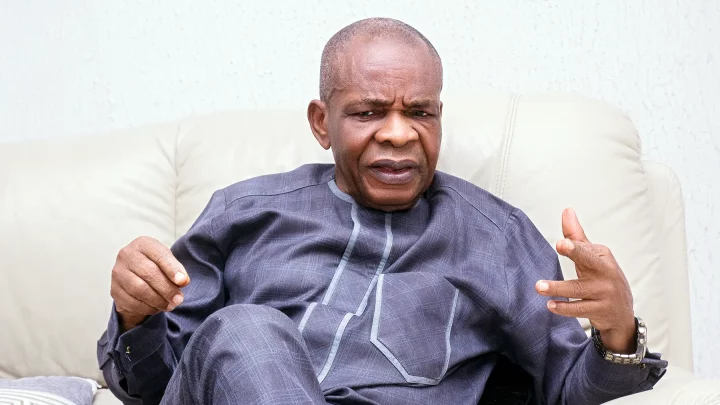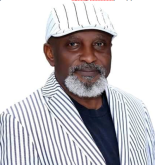By Ibanga Isine
Nigeria’s rising insecurity has drawn sharp condemnation from former Minister of Lands, Housing and Urban Development, Chief Nduese Essien, who says the country is “dangerously close to normalising terror” following a fresh wave of attacks, killings, and mass kidnappings.
In a statement issued on Monday, Chief Essien said he addressed the nation “with a heavy heart and a profound sense of responsibility,” noting that the situation has deteriorated to an alarming level.
According to him, Nigeria today resembles “a nation in distress,” with violent crimes increasing in both frequency and brutality.
He cited a series of recent incidents that he described as “a clear picture of collapse.” Among them were the kidnapping and execution of Brigadier General Musa Uba and three soldiers in Borno State; the abduction of 64 people in Zamfara State, and the attack on a school in Kebbi State, where 25 female students and their principal were taken, while the vice principal was killed.
You can also read – Why Fixing Potholes Won’t Eliminate Bad Roads in Uyo
He pointed to the attack on Christian worshippers in Kwara State, where three people were killed and 38 abducted, as well as the murder of a police officer in Geidam, Yobe State. In Gwoza, eight Civilian Joint Task Force members were killed and three kidnapped, while in Sokoto, nursing mothers and newborns were among 15 kidnapped, as two people were murdered. Only days earlier, over 300 students were abducted from a Catholic school in Niger State.
“These tragedies are no longer isolated events; they have become daily realities,” he said. “Schools are being shut down, families are afraid to send out their children, farmers have abandoned their fields, and worshippers no longer feel safe in their own sanctuaries.”
Chief Essien criticised the response of President Bola Ahmed Tinubu’s administration, saying leadership at the federal level has failed to match the seriousness of the crisis. “President Tinubu was once among the loudest critics of the Jonathan administration, demanding accountability for every life lost,” he said. “Today, the insecurity he decried has worsened dramatically, yet the leadership he promised has not materialised.”
He expressed particular concern over the appointment of defence ministers “with little or no experience in security or defence operations,” arguing that Nigeria cannot confront highly adaptive terrorist groups with politically selected leaders. “Defence is not a political reward; it is the backbone of national survival,” he said. He added that allegations that some officials may have sympathies or links with terrorist networks “only deepen public anxiety.”
“Nigeria must abandon the culture of excuses and political diversions that mask the real issues. The primary responsibility of government is to protect its citizens, not to rationalise the motives of terrorists or craft narratives of shared victimhood. Terrorism has religious, economic, political, and social roots that must be addressed honestly. It is counterproductive to shape national security decisions around the perceived sensitivities of foreign leaders. The killings are happening on Nigerian soil; the victims are Nigerians. Our leaders must prioritise Nigeria,” Chief Essien said.
He called for a comprehensive national security strategy built on strong intelligence gathering, community-based security systems, properly equipped armed forces, and leadership by competent professionals. He said Nigeria must confront the “uncomfortable reality” that some individuals within the security or political system may be enabling terrorism. “Those who fund, support, or protect terrorists, regardless of their status, must be identified and held accountable,” he declared.
You can also read – Before We Crucify Rufai Oseni
The elder statesman also linked the deepening crisis to socio-economic failures. He warned that uncontrolled population growth—especially in communities where having many children is encouraged—has produced millions of vulnerable, uneducated youths who are easily recruited into crime. “Millions of underaged children roam the streets without education, guidance, or hope,” he said. “Their parents cannot provide for them, and the government either lacks the will or capacity to intervene.”
Corruption, he added, is “another cancer eating at Nigeria’s core,” undermining the country’s ability to secure itself. “A government that cannot control corruption cannot secure its people,” he said, noting that public funds continue to leak despite the nation’s substantial revenues.
Chief Essien warned that politicising security may ultimately be more dangerous than terrorism itself, as it destroys public trust and pushes the nation toward instability. He urged traditional rulers, religious leaders, civil society organisations, and patriotic citizens to support efforts to restore order, but insisted that support must be “constructive, demanding competence and transparency.”
He also condemned what he called the government’s “systematic suppression of opposition,” describing it as “political terrorism.” According to him, “A democracy that silences dissent stands on the brink of dictatorship.”
Chief Essien concluded by urging President Tinubu to provide “decisive and visionary leadership,” insisting that the National Security Adviser, Defence Ministers, and Service Chiefs “must prove their capacity or resign.”




